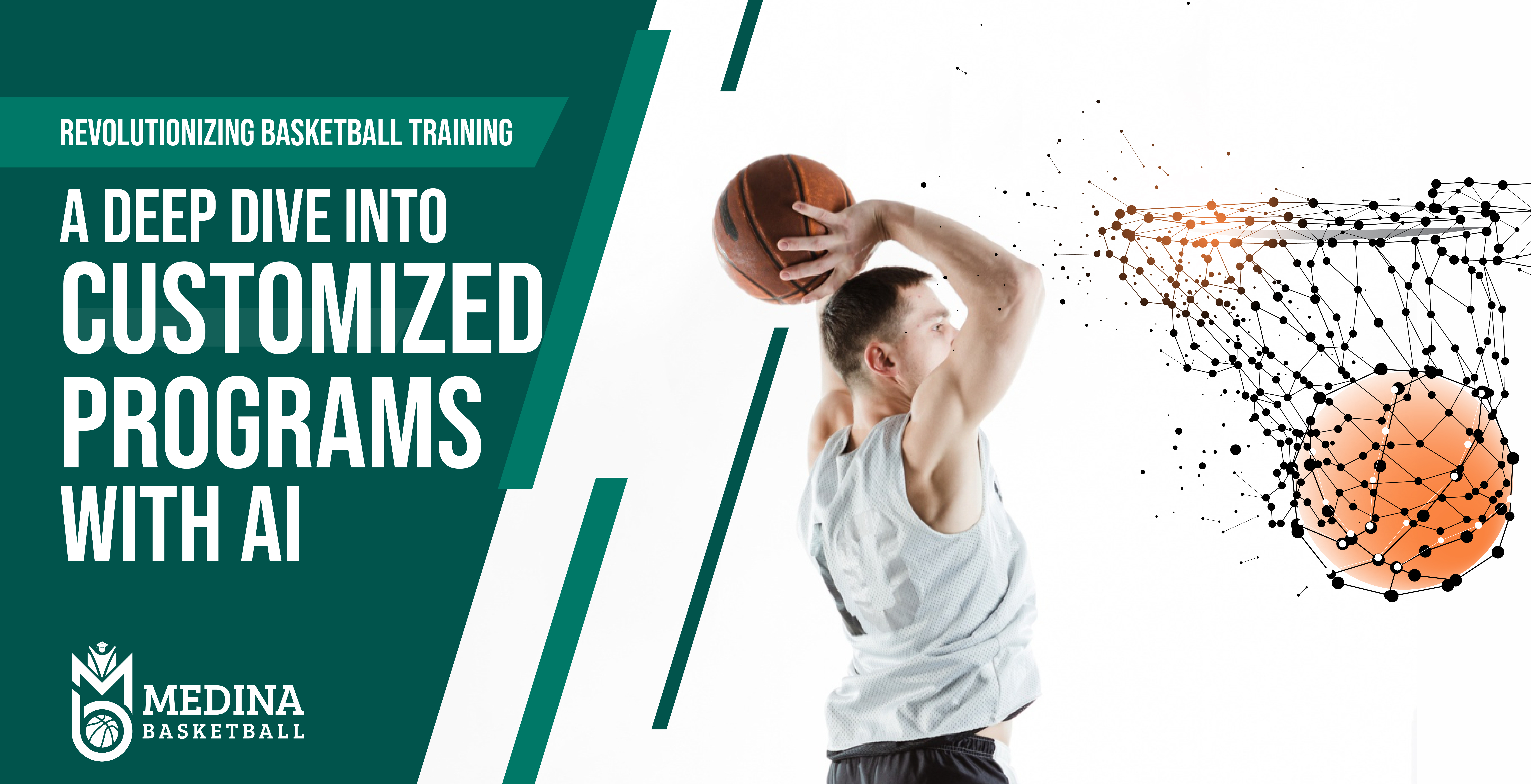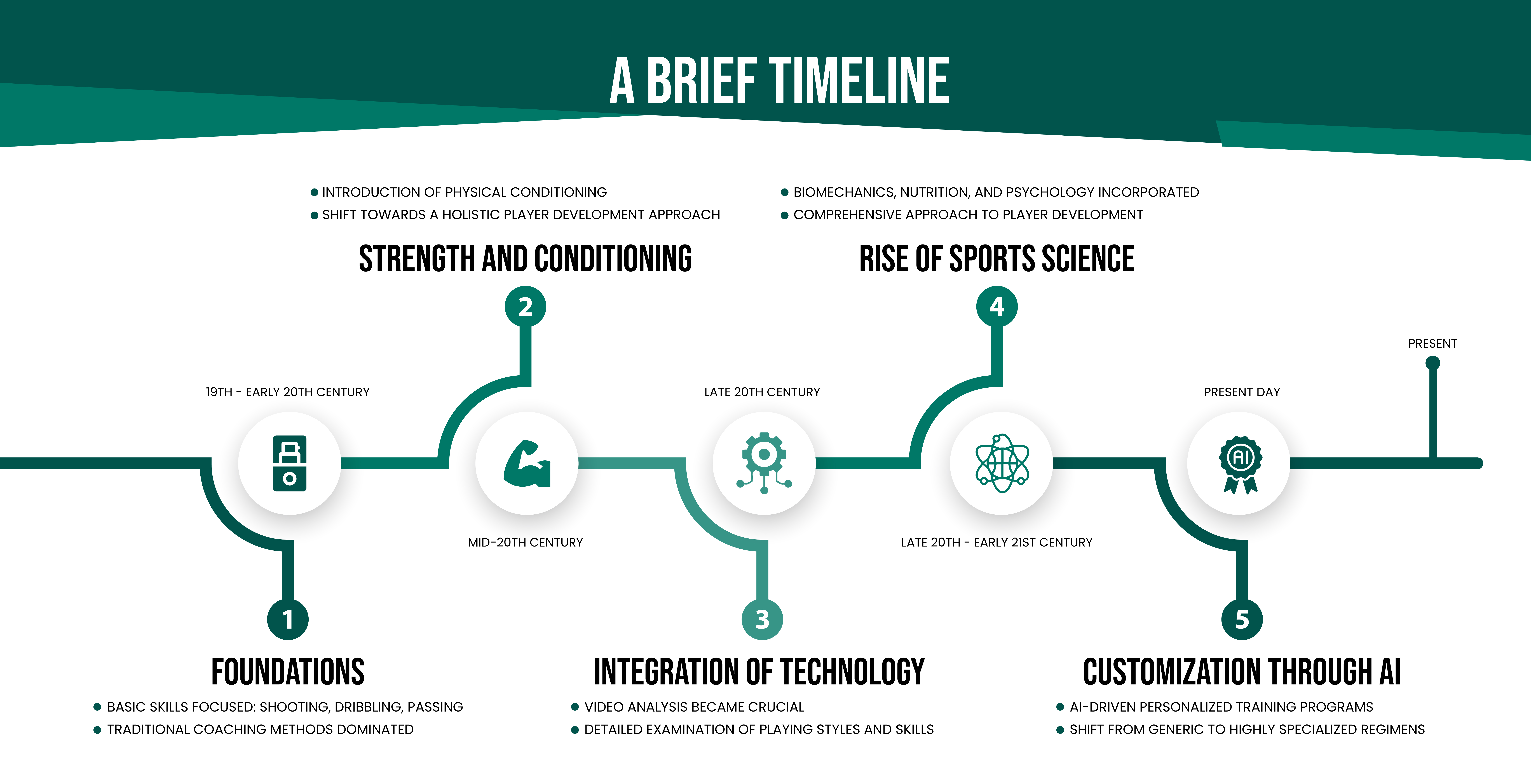Picture this: the buzzer sounds, the crowd roars, and you're on the court, ready to…

Basketball training has come a long way since its inception, evolving from simple drills to highly sophisticated and personalized programs. The journey of basketball training has been marked by significant milestones, shaped by advancements in sports science, technology, and a deeper understanding of the sport.
AI in Basketball Training
Artificial Intelligence (AI) has transcended its traditional realms and emerged as a game-changer in the world of sports training. In the context of basketball, AI is reshaping how players hone their skills, coaches strategize, and teams elevate their performance.
- AI Applications in Sports Training: An Overview: AI’s influence in sports training extends beyond basketball, encompassing various disciplines. In basketball, AI is a powerful tool that utilizes machine learning algorithms to analyze vast amounts of data, offering insights that were once unimaginable. From performance analytics to injury prevention, AI’s applications are diverse and transformative.
- Data Analytics in Basketball Training: AI’s prowess lies in its ability to process and interpret extensive datasets. In basketball training, this means analyzing player performance metrics, game statistics, and even biometric data. Coaches and trainers can gain a nuanced understanding of a player’s strengths, weaknesses, playing style, and physical condition, paving the way for highly targeted and personalized training programs.
- Machine Learning and Personalized Training Programs: One of the key strengths of AI lies in its capacity to learn and adapt. Machine learning algorithms can evaluate a player’s performance over time, identify patterns, and dynamically adjust training programs accordingly. This level of customization ensures that each player receives a training regimen tailored to their unique needs, optimizing skill development and overall performance.
- Real-Time Feedback for Accelerated Learning: Traditional coaching methods often rely on post-game analysis and periodic assessments. AI changes the game by providing real-time feedback during training sessions. Through sensors and wearable technology, players receive instant insights into their movements, decision-making, and performance. This immediate feedback loop accelerates the learning process, allowing players to make on-the-fly adjustments.
- Injury Prevention and Recovery Strategies: AI goes beyond skill enhancement; it plays a crucial role in player well-being. By analyzing biomechanical data and monitoring fatigue levels, AI can assist in designing injury prevention programs. Additionally, it aids in crafting personalized recovery strategies, ensuring that players maintain peak physical condition throughout the season.
- Examples of Successful AI-Driven Training Programs: Several basketball teams and organizations have embraced AI with remarkable results. From the NBA to grassroots programs, AI-driven training has become a staple in player development. Case studies highlight how AI has contributed to improved shooting accuracy, enhanced decision-making on the court, and reduced instances of injuries.
- Integration with Traditional Coaching Methods: While AI brings cutting-edge technology to the forefront, its successful integration with traditional coaching methods is crucial. Effective coaching combines the nuanced insights provided by AI with the human touch – understanding the psychological aspects of player motivation, team dynamics, and fostering a supportive learning environment.
- Challenges and Ethical Considerations: As with any transformative technology, AI in basketball training comes with challenges. Privacy concerns, data security, and ethical considerations must be addressed. Striking the right balance between data-driven insights and maintaining the integrity of the sport is a critical aspect of AI integration.
- Looking Ahead: The Future of AI in Basketball Training: The current landscape of AI in basketball training is dynamic, with ongoing research and development pushing the boundaries. From advancements in virtual reality training simulations to AI-driven strategy predictions, the future promises even more sophisticated applications, further revolutionizing how the game is played and coached.
Understanding AI in basketball training is not just about embracing a cutting-edge technology; it’s about unlocking new dimensions of player potential. As AI continues to evolve, its role in basketball training will likely become more pronounced, shaping a future where athletes reach unprecedented levels of skill, intelligence, and overall performance on the court.
Advantages of AI in Basketball Training
Artificial Intelligence (AI) has emerged as a transformative force in basketball training, ushering in a new era of personalized and data-driven player development. The advantages offered by AI in this context are not just incremental; they represent a paradigm shift in how players hone their skills and teams strategize for success. The advantages of AI in basketball training extend far beyond the confines of traditional methods. From personalized skill development to injury prevention and team optimization, AI is a catalyst for unlocking the full potential of players and teams. As technology continues to evolve, the integration of AI in basketball training promises to redefine the standards of excellence on the court.
- Maximizing Efficiency and Effectiveness: AI’s ability to process and analyze vast amounts of data at unprecedented speeds is a game-changer. This efficiency allows for the creation of highly targeted and personalized training programs. Players can focus on specific aspects of their game that need improvement, optimizing the use of training time for maximum impact.
- Personalized Workout Routines and Drills: One-size-fits-all training regimens are a thing of the past. AI enables the creation of personalized workout routines and drills based on individual player profiles. Whether it’s improving shooting accuracy, refining defensive skills, or enhancing overall athleticism, AI tailors training plans to address specific needs, fostering accelerated skill development.
- Adaptive Training Schedules Based on Player Progress: AI doesn’t just stop at initial assessments; it continually adapts to a player’s progress. Through machine learning algorithms, training programs evolve based on real-time performance data. If a player masters a certain skill quickly, the AI adjusts the training plan accordingly, ensuring that players are always challenged at an optimal level.
- Real-Time Feedback for Immediate Improvement: Waiting for post-game analysis is a thing of the past. AI provides real-time feedback during training sessions. Through sensors and wearable technology, players receive instant insights into their movements, decision-making, and overall performance. This immediate feedback loop facilitates on-the-fly adjustments, leading to faster and more effective skill acquisition.
- Injury Prevention and Recovery Strategies: AI’s capabilities extend beyond skill enhancement; it plays a crucial role in player health. By analyzing biomechanical data and monitoring fatigue levels, AI assists in crafting injury prevention programs. Personalized recovery strategies are designed to ensure that players maintain peak physical condition, reducing the risk of injuries and enhancing overall longevity in the game.
- Enhanced Decision-Making on the Court: Basketball is a game of split-second decisions, and AI contributes significantly to honing these decision-making skills. By analyzing game scenarios, player movements, and historical data, AI assists players in making smarter decisions on the court. This cognitive aspect of AI training is invaluable for developing strategic thinking and situational awareness.
- Tailoring Training to Team Dynamics: AI isn’t just about individual player development; it can also optimize team dynamics. By analyzing how players interact on the court, AI can suggest strategies that capitalize on the strengths of the entire team. This collaborative approach ensures that training programs align with the team’s playing style, fostering cohesive and synchronized gameplay.
- Global Accessibility to Training Expertise: AI in basketball training breaks geographical barriers. Players anywhere in the world can access top-tier training expertise through AI-driven platforms. This democratization of training resources levels the playing field, providing opportunities for players from diverse backgrounds to benefit from cutting-edge coaching and development programs.
Challenges and Considerations in AI-Powered Basketball Training
- Privacy and Data Security Concerns: As we embrace the benefits of AI in basketball training, privacy and data security emerge as critical considerations. The extensive data collection involved in personalized training programs raises concerns about how player information is stored, accessed, and protected. Striking a balance between harnessing valuable insights and safeguarding player privacy is paramount for the ethical integration of AI in sports.
- Integrating AI with Traditional Coaching Methods: While AI brings cutting-edge technology to the court, successful integration with traditional coaching methods is essential. Coaches must navigate the dynamic between AI-driven insights and their invaluable human touch. Balancing the art of coaching, which involves understanding player psychology, team dynamics, and motivation, with the precision of AI analytics is a challenge that demands a thoughtful and collaborative approach.
- Accessibility and Affordability of AI-Powered Training Programs: The transformative power of AI in basketball training should not be limited to elite athletes or well-funded programs. Ensuring accessibility and affordability of AI-powered training programs is a challenge that the sports community must address. Striving for inclusivity will democratize access to advanced coaching resources, offering opportunities for aspiring players across diverse backgrounds to benefit from the advantages of AI in their development journey.
How Coaches Can Incorporate Ai Into Their Coaching Strategies?
As the basketball world embraces technological advancements, coaches stand at the forefront of a transformative era by integrating Artificial Intelligence (AI) into their coaching methodologies. Through data-driven decision-making, coaches can gain deeper insights into player performance, enhancing strategic planning for more precise and effective game-time decisions. Leveraging AI’s personalization capabilities allows coaches to tailor training programs to each player’s unique needs, accelerating skill development and fostering a well-rounded team. The immediacy of AI-generated insights enables real-time feedback during training sessions, promoting continuous improvement and adaptability. Coaches can also utilize AI for opponent analysis, dissecting playing styles and strategies to gain a strategic edge. Integrating AI with traditional video analysis creates a comprehensive coaching toolkit, automating meticulous tasks and allowing coaches to focus on strategy and player development. Successful integration involves striking a balance between AI analytics and human expertise, where coaches bring nuanced understanding and interpersonal skills to mentor and lead teams effectively. This synergy between human coaching and AI-driven insights marks a new era in basketball coaching, unlocking the full potential of teams on and off the court.
The evolution from traditional training methods to the current landscape of personalized programs reflects a commitment to maximizing player potential and team performance. The ability of AI to process extensive data sets and create personalized workout routines addresses the unique needs of each player, fostering accelerated skill development. Real-time feedback loops and injury prevention strategies elevate player performance and well-being, showcasing the holistic impact of AI in player development. Coaches, armed with data-driven insights, can make informed decisions, create targeted game plans, and optimize training regimens for peak efficiency.
Striking the right balance between technology and human expertise is key to unlocking the full potential of customized training programs with AI. The journey doesn’t end here; it evolves. As we peer into the future, the trajectory of AI in basketball training promises even more sophisticated applications. From advanced virtual reality simulations to AI-driven strategy predictions, the possibilities are boundless. Customized basketball training with AI is not just a snapshot of the present; it’s a glimpse into the future, where athletes reach unprecedented levels of skill, intelligence, and overall performance on the court. As players and coaches continue to embrace this transformative wave, the synergy between human intuition and AI-driven insights will undoubtedly redefine the standards of excellence in basketball training.



